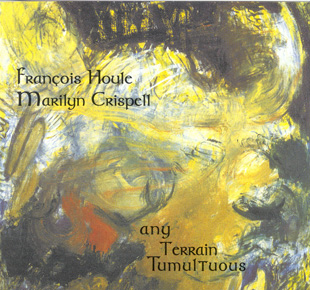©Laurence M Svirchev
 Some landscapes are so terrifyingly beautiful and forbiddingly austere that only the most masterful musicians dare navigate them and return home triumphantly. On Any Terrain Tumultuou, François Houle (clarinet) and Marilyn Crispell (piano) explore such vistas with a complex interplay between written and improvisational sections, periods of quietude released from dynamic harmonic tension, and dramatic story-telling.
Some landscapes are so terrifyingly beautiful and forbiddingly austere that only the most masterful musicians dare navigate them and return home triumphantly. On Any Terrain Tumultuou, François Houle (clarinet) and Marilyn Crispell (piano) explore such vistas with a complex interplay between written and improvisational sections, periods of quietude released from dynamic harmonic tension, and dramatic story-telling.
The first cut, “Any Terrain Tumultuous Part I”, begins with four slow and lonely clarinet notes. The stark quality of those notes is enhanced by playing the clarinet directly into the piano cavity; this “second” instrument yields higher harmonics and reverberations from its wood and strings. Houle then enlarges the scope of the motif by playing two B-flat clarinets simultaneously which further amplifies the harmonics and reverberation. By letting the dissonant harmonics settle out into stillness, Houle provokes eerie dramatic suspense before recommencing the cycle of notes.
Crispell’s solo is no less intriguing. After a brief interplay with the clarinetist, she percusses the highest treble notes one at a time while depressing the sustain pedal. This technique yields tremendous reverberation within the instrument body. She then launches a left hand treble tremolo, the right hand building a seven note melody.
With this melody clearly established, Houle then joins Crispell almost note-for-note in the statement. Along with the tremolo, the melody moves incrementally up the range of both instruments with each musician adding subtle counterpoints until an abrupt resolution is reached.
“Any Terrain Tumultuous Part I” is a masterpiece of contemporary music; by any standard of musical excellence it should become a classic of the improvisational jazz idiom. The piece is stupendously evocative, the kind of spare music that provokes forsaken memories of primeval emotions.
“Marsayas,” on the other hand, tells the ancient story of the satyr who challenged Apollo to a flute competition. Having lost the contest to the god of music, Marsayas was flayed alive. The music is constructed as a four-part tone poem, with Houle’s clarinet sounding the flute and Crispell working strings and wood inside the piano cavity.
From note one of this CD, there is a palpable sense of communication between Crispell and Houle, remarkable because this is their first musical encounter. The situation was propitious enough for Crispell to bring out an unrecorded composition, “Song for Jeanne Lee”. “I’ve waited ten years for the right situation to record this,” she said.
The spirit of communion was undoubtedly enhanced by recording in a large, open room of an old house with plants and a view of the of up-state New York’s Catskill Mountains. In fact, the astute listener can detect the harmonic ambience of the room itself, not to mention the breath of the clarinetist, the action of the piano and clicking of instrument keys, even minor movements of the musicians themselves as they shift position.
Any Terrain Tumultuous, examined from any contour, is a major work. To delve further into the creative process that brought about this marvelous music, take a look at Catriona Strang’s poem on the inside cover and compare its taut cadence to the music and titles of the songs.
Any Terrain Tumultuous, Red Toucan RT9305-2
Originally published in 5/4 Magazine “Eye on Vancouver” column, 2005